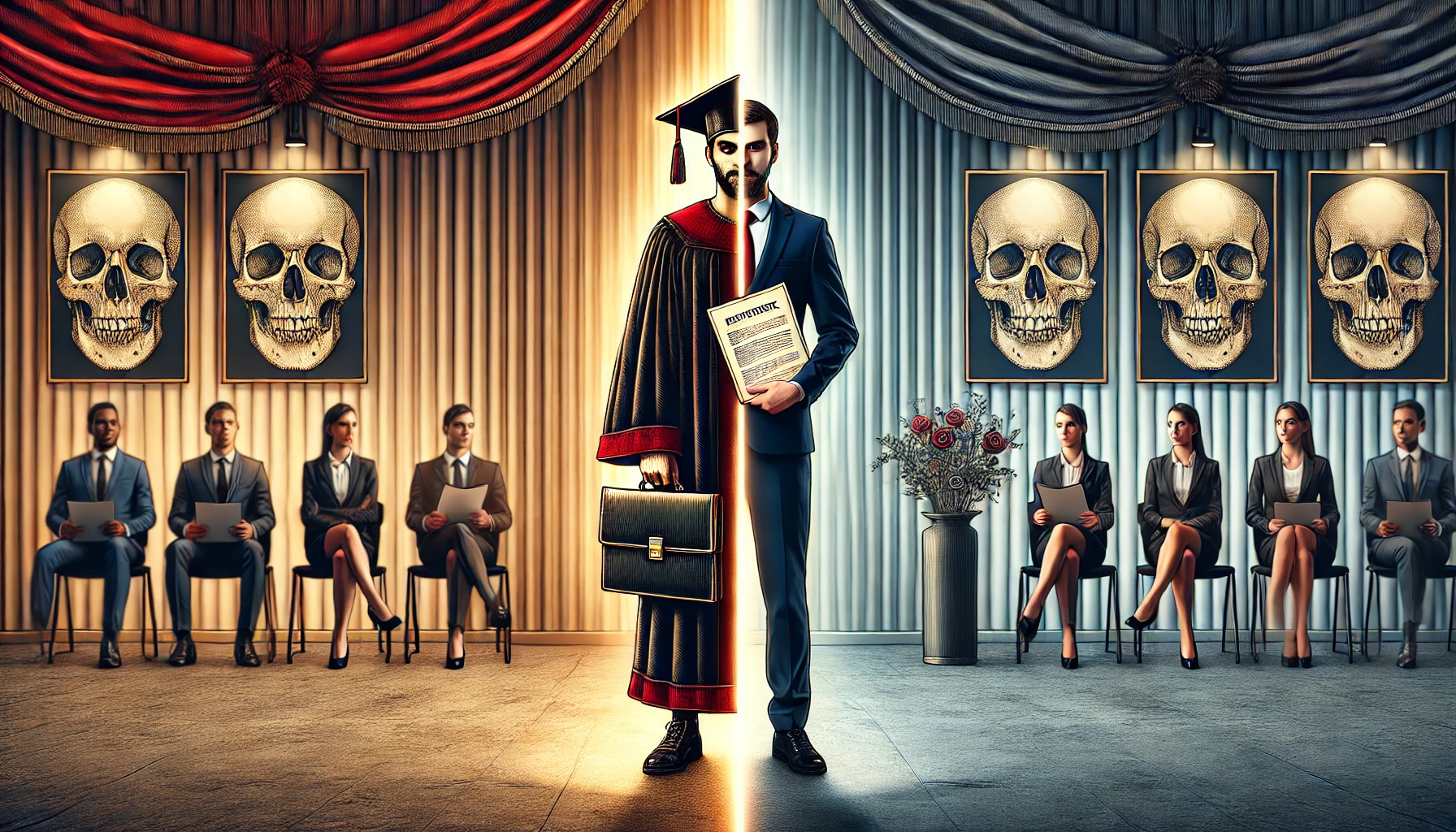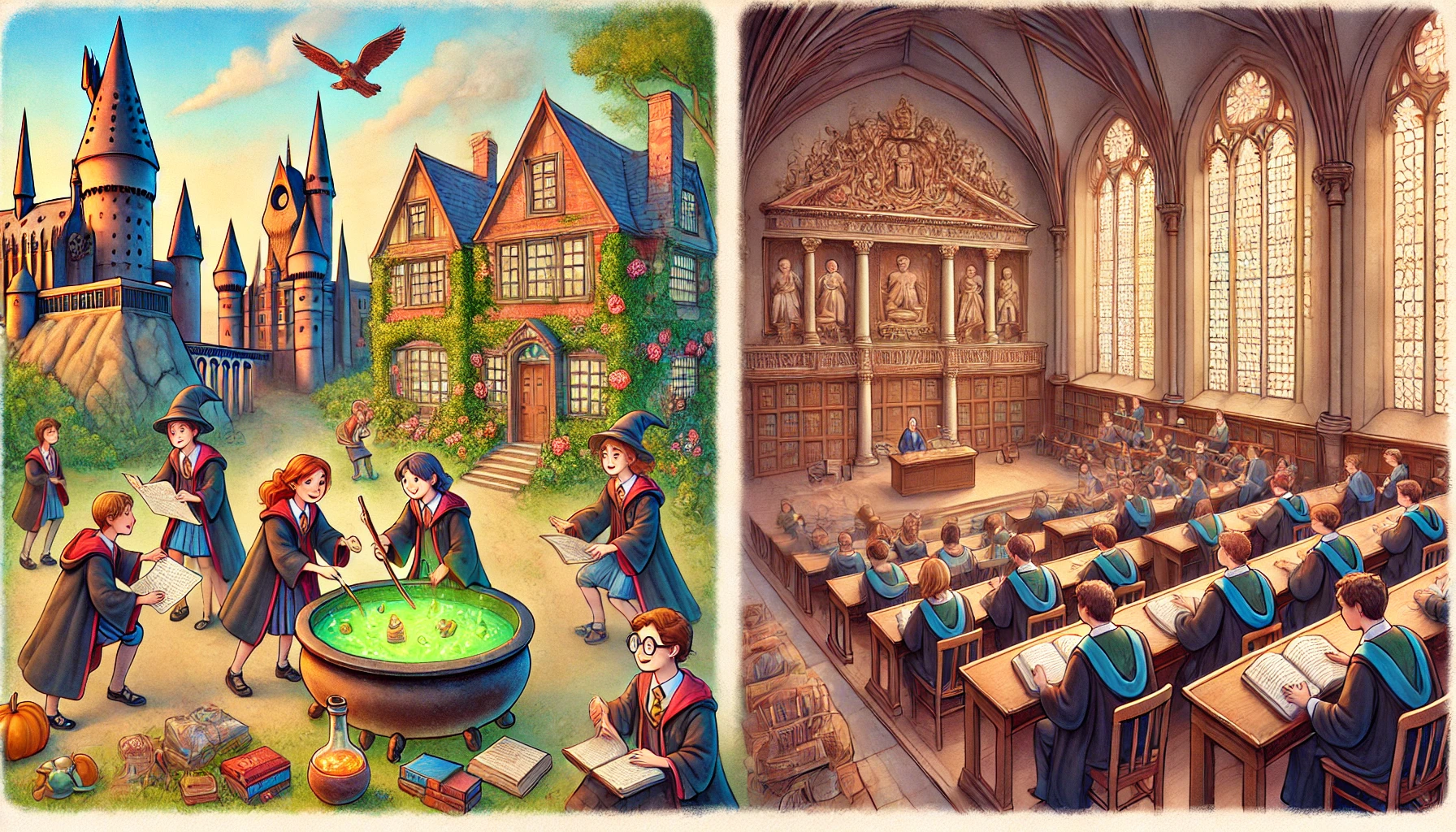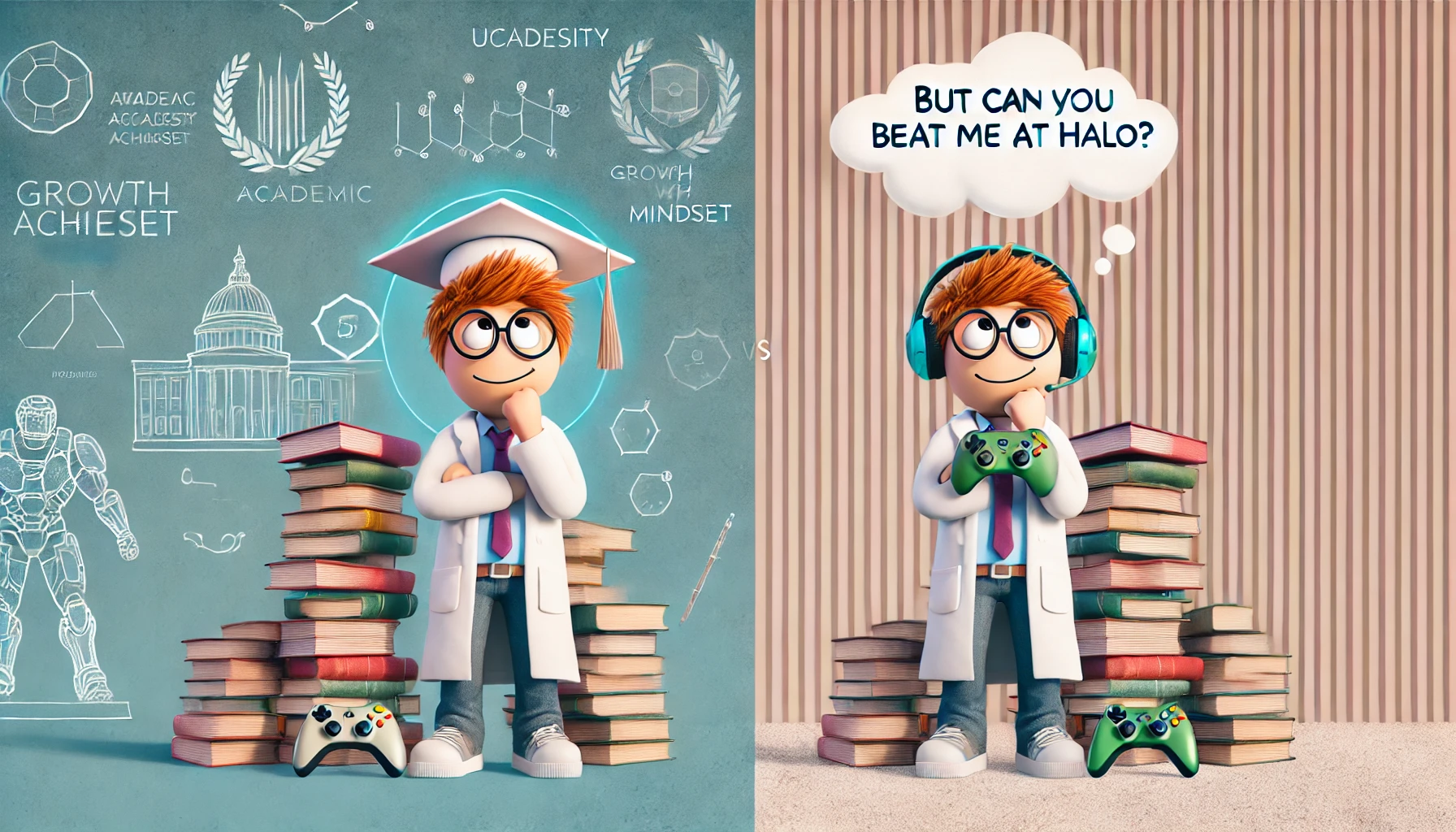The ‘Degree or No Degree’ Conundrum: A Hamlet-esque Dilemma in the Corporate World
In the grand theater of life, we often find ourselves on a stage not unlike that of our dear friend Hamlet. But instead of pondering “To be or not to be,” many of us grapple with another existential question: “Degree or no degree?” Enter scene one: two candidates stand in the wings, waiting for their call to center stage—one armed with an impressive parchment from a university and the other wielding nothing but raw experience and sheer grit.
Our first character is Degree-laden Daryl. He’s spent four years buried under piles of textbooks at college or university, while juggling internships like hot potatoes straight out of the oven. His resume gleams brighter than his polished loafers as he waltzes into interviews, quoting Adam Smith’s Wealth of Nations verbatim (in Latin!). To him, college was like Hogwarts without magic—filled with late-night cramming sessions where coffee flowed more freely than water.
On the flip side stands Non-degree Nancy, who ditched traditional education after high school graduation for real-world learning experiences. She’s been hustling since she could say ‘entrepreneurship,’ building successful startups from scratch even before most people her age learned how to cook pasta without burning down the kitchen! Her wisdom isn’t derived from dusty old books but from the blood, sweat, and tears of experience that can’t be taught within the confines of any classroom.
Now, let’s imagine these two contenders vying for the same job in a company whose motto reads, “fostering a growth mindset.” The hiring manager sits across from them both, wondering whether to go by bookish knowledge or street smarts. Is a university degree really the end-all-be-all litmus test for validating a candidate’s potential?
Here’s the punchline: A true growth-minded company would recognize the value each candidate brings to the table, despite their divergent paths to professional development. After all, life is not a multiple-choice test but an open-ended essay question! It would understand that while Daryl’s academic prowess brings theoretical knowledge and analytical skills, Nancy’s hands-on experience offers practical insights and problem-solving abilities.
In this corporate comedy of errors, the real folly lies in believing there’s only one path to success or growth. The ‘degree vs. no degree’ debate should be less about choosing sides and more about appreciating the spectrum of learning experiences each candidate represents. After all, isn’t variety the spice of life? So next time you find yourself caught in a Hamlet-esque dilemma between Degree-laden Daryls and Non-degree Nancys, remember—both can add value to your company if given the right opportunity!
As we conclude our tale, the hope is that hiring managers will see beyond mere degrees ,because the true measure of a person’s worth lies not just in their accolades but in how they’ve used what they’ve learned for the betterment of themselves and those around them.
And thus, the curtain closes on another episode of Corporate Chronicles, leaving us pondering the immortal words Shakespeare himself might have said had he been a CEO instead of a playwright: “Degree or No Degree; That Should Never Be the Only Question!“

Why Homer Simpson Still Has a Job (And What That Says About Degrees)
In the grand pantheon of pop culture, few characters are as enduring or iconic as Homer Simpson. The bumbling but lovable patriarch from The Simpsons has been gainfully employed at Springfield’s Nuclear Power Plant for over 30 years—a feat that seems to defy logic given his penchant for accidents and general incompetence. Now juxtapose this with your average college graduate who is armed with degrees, knowledge, and an eagerness to contribute meaningfully in their chosen field, yet struggles to find consistent employment.
On one hand, we have Homer—no degree (unless you count his brief stint at clown college), seemingly low IQ, questionable work ethic, and zero interest in personal growth; on the other hand, we have our educated job seeker—equipped with specialized skills acquired through rigorous academic training, bursting with potential but often overlooked by employers due to lack of experience or perhaps because they’re overqualified.
So why does Homer still hold down a job while many qualified individuals struggle? Is it merely comedic license taken by cartoon writers, or could there be some deeper insights into hiring practices?
Let’s dive into what makes Mr. Simpson so employable despite all odds! First, familiarity breeds contentment. In spite of being woefully underqualified compared to most employees today (and let’s not even get started about safety regulations!), he knows his way around Sector 7G like nobody else can—after all, those years on the job surely count for something!
This brings us neatly onto another point which might make HR departments squirm uncomfortably: loyalty isn’t always rewarded proportionally according to skill level or qualifications. It’s evident when looking at how long-time staff members such as Lenny Leonard and Carl Carlson consistently outlast younger, more ambitious colleagues trying to climb the corporate ladder without understanding company culture first.
Thirdly, remember those times when everything seemed doomed until they were miraculously saved at the last minute? That was likely thanks to perseverance and resilience—traits often overlooked in modern recruitment processes favoring technical skills over soft ones.
Lastly, let’s not forget the power dynamics at play here: Mr. Burns might be a tyrant, but he recognizes Homer as an integral part of his team (even if it is for the wrong reasons). This illustrates how networking and building strong professional relationships can sometimes trump qualifications.
Now, we’re certainly not suggesting that higher education is unnecessary or that everyone should aspire to be like Homer Simpson! However, this comparison does highlight some interesting points about hiring practices and growth mindset in companies today. It suggests that there are other factors beyond formal education which could determine someone’s success within a particular role or company.
In conclusion, while having degrees may open doors initially, they aren’t always the key to long-term job security and happiness—just ask our favorite yellow cartoon character! So next time you find yourself stressing out because your resume doesn’t boast enough academic accolades, remember the old saying, “It’s what’s inside that counts”—even in the world of employment!
So whether you’re an aspiring nuclear safety inspector with no degree in sight, or a recent graduate struggling to land your first gig—keep pushing forward with resilience and adaptability; who knows? You might just end up being more successful than anyone ever expected…just like good ol’ Homer J. Simpson!

From Hogwarts to Harvard: The Magic of Non-traditional Learning Paths
As we dive into the realm of non-traditional learning paths, let’s compare two seemingly disparate entities: Hogwarts School of Witchcraft and Wizardry—a place where magic isn’t just in the air but part of the curriculum—and Harvard University, an institution practically synonymous with prestige, intellectuality (and some might say snobbery).
Now, before you start picturing Dumbledore giving lectures at Harvard or Hermione Granger trading her wand for a calculator to tackle Economics 101—hear me out. The comparison here doesn’t revolve around magical spells versus theoretical physics; it’s about understanding how different approaches toward education can mold us into skilled professionals.
Let’s talk first about our beloved Hogwarts. It may not be accredited by any Muggle educational body (the Ministry of Magic probably wouldn’t care much for such mundane validations), yet its teaching style has something unique going on. At this school nestled amidst the Scottish Highlands, students learn through practical experiences rather than rote memorization from dusty textbooks. They brew potions under Snape’s watchful eye instead of merely reading their chemical equations off chalkboards; they wave their wands uttering incantations as opposed to writing essays on abstract concepts without experiencing them firsthand.
Contrast this with traditional institutions like Harvard, which exude gravitas and academic rigor in every corner stone etched with Latin phrases no one understands anymore! Here, knowledge acquisition largely happens within lecture halls filled to the brim with eager minds feverishly taking notes while professors pontificate from behind podiums. Don’t get me wrong—there are hands-on labs too, but mostly after those long theory classes have drilled enough facts down your throat!
But wait! Is that really so bad? Isn’t cramming information necessary sometimes? Well, yes…if you’re trying to win Jeopardy! perhaps! But when it comes to developing real-world skills—not always ideal.
The beauty lies in marrying these contrasting methods together—a blend of practical, experiential learning with rigorous academic study. It’s about applying the knowledge you gain through theoretical understanding to real-life situations and problems—like using your potions class to whip up a cure for the common cold or leveraging that economics degree to solve global poverty (no pressure!).
Non-traditional paths like Hogwarts offer an element of freedom, encouraging creativity and exploration which traditional institutions often lack in their pursuit of academic excellence. On the other hand, places like Harvard instill discipline and provide structure—vital aspects when it comes to mastering complex subjects.
And here’s where we circle back around to our original question: Is not hiring someone because they don’t have a formal degree demonstrating a growth mindset? The answer lies somewhere between platform 9¾ and Harvard Yard. Just as both Hogwarts’ magical methods can co-exist harmoniously alongside Harvard’s intellectual rigor, so too should companies be open-minded toward candidates who may not fit into conventional educational molds but bring valuable skills honed via non-traditional routes.
So next time you’re interviewing someone, remember this—if Harry Potter walked into your office sans any Muggle university credentials, would you turn him away just because he didn’t go Ivy League? I think not! After all, anyone capable enough of handling ‘He-Who-Must-Not-Be-Named’ surely has some transferable skills worth considering!
In conclusion, folks—whether from Hogwarts or Harvard or anywhere else on Earth (or beyond), what truly matters is one’s ability to learn continuously, adapt to new environments and challenges—the true essence of a growth mindset! So let us embrace diversity in education and celebrate the magic of non-traditional learning paths.

‘You’re Fired!’ – Are We Living in an Apprentice Episode or Real Life?
In the grand theater of life, we often find ourselves caught between two starkly contrasting realities. One is a glossy, high-definition world filled with well-coiffed individuals uttering catchphrases (or in this case—firing phrases) like they’re going out of style; let’s call it “The Apprentice Episode.” The other one? It’s our everyday grind—real life where getting fired doesn’t come with dramatic background music or commercial breaks.
Let us first dive into the realm of the reality TV show The Apprentice, shall we? Herein lies a universe governed by Donald Trump’s iconic phrase: “You’re Fired!” This isn’t just any old dismissal from work—it’s an event! A spectacle designed for prime-time television slots. In this alternate dimension, being canned comes complete with suspenseful build-ups and cliffhangers that keep audiences on tenterhooks until next week’s episode. And what about those boardroom meetings? They are as glamorous as they get—gleaming tables long enough to land small aircraft upon them and contestants dressed sharper than their wit!
Now, contrast that against your typical day in corporate America—or anywhere else around the globe for that matter—and you’ll see how different things truly are when stripped of all glitz and glamour. Instead of snazzy suits and skyscraper views, most people experience layoffs within less exciting settings such as drab office cubicles under fluorescent lights while nursing lukewarm coffee mugs.
But here’s where it gets interesting, folks! If companies were more open-minded toward hiring candidates without college degrees—a perfect demonstration of a growth mindset—they might be surprised at who ends up saying, “You’re hired” instead!
Consider Bill Gates or Steve Jobs—college dropouts turned tech titans—who not only built empires but also paved new paths for innovation altogether! Now imagine if businesses had dismissed these luminaries based solely on their lack of a degree—we would still be typing away on typewriters and making calls from payphones!
So, are we living in an Apprentice episode or real life? Well, the answer is a bit of both. The drama and tension that surround job terminations aren’t entirely fictional—they’re just amplified for TV ratings. But if companies started valuing skills over degrees—showing some good ol’ growth mindset—we might see fewer “You’re Fired!” moments and more success stories.
In conclusion, yes, it’s fun to watch people get fired on television (as long as you’re not one of them). And yes, it can feel like reality has taken a page out of Trump’s book when layoffs happen en masse, without much regard for individual potential beyond academic qualifications. But remember folks—this isn’t prime-time television; this is your career! So let’s strive toward fostering environments where every kind of talent gets its fair shot at saying, “I’m Hired!” rather than worrying about hearing those two dreaded words—”You’re Fired!”

The Big Bang Theory vs. Reality: Does Sheldon’s Ph.D. Make Him Growth-Minded?
The Big Bang Theory, a beloved sitcom that has graced our screens for over a decade, introduced us to the enigmatic and eccentric character of Dr. Sheldon Cooper. With his Ph.D. in theoretical physics from Caltech University, he often comes off as the epitome of intelligence and academic achievement. But does this make him growth-minded? Let’s dive into it.
First, let’s establish what we mean by ‘growth mindset.’ Coined by psychologist Carol Dweck after decades worth of research on achievement and success, it is essentially an individual’s belief about learning; those with a ‘growth’ mindset believe they can learn more or become smarter if they work hard enough at it, while individuals with fixed mindsets feel their abilities are unchangeable—like Sheldon’s love for the “Soft Kitty” song when he’s sick.
Now back to our main man—Mr. Sheldon Lee Cooper B.S., M.S., M.A., Ph.D., Sc.D (a title longer than Daenerys Targaryen’s). He certainly has an impressive collection of degrees, which would suggest he values education highly, but here’s where reality diverges from The Big Bang Theory universe: having multiple degrees doesn’t necessarily equate to possessing a growth mindset!
Let me explain why, using some classic examples from the show itself! Remember how frequently Sheldon refused help or advice because “he knew better”? Or remember his constant dismissal of Howard Wolowitz, who held only an engineering degree instead of doctorates? These instances clearly show that despite being academically accomplished himself, Dr. Cooper didn’t always value continuous learning, nor did he appreciate diverse forms of knowledge outside his own field—traits synonymous with someone holding onto their fixed mindset rather than embracing any formative changes, i.e., a growth mindset.
In contrast, though, there were moments where glimmers of hope shone through, revealing potential hints toward developing such an attitude—like when Penny beat him at Halo, making him question his gaming skills, or when he had to learn how to drive. These instances showed Sheldon’s willingness (though begrudgingly) to accept new challenges and learn from them.
So in the grand scheme of things, does a company choosing not to hire candidates without college degrees demonstrate a growth mindset? Not necessarily! Just like our dear Dr. Sheldon Cooper with all his academic prowess, it doesn’t automatically make you open-minded or willing to grow. The key lies within the ability to adapt to change, embrace diverse forms of knowledge and experience, and continuously strive for improvement rather than resting on the laurels of past achievements.
In conclusion, while we love watching Sheldon’s antics unfold on screen, let’s remember that having a Ph.D. is more about dedication and discipline rather than an automatic ticket into the Growth Mindset Club! So next time someone tells you they have multiple doctorates, just ask if they’re also good at Halo—because that’s where real growth happens, folks!

Steve Jobs, Mark Zuckerberg, and the College Dropout Hall of Fame
It’s a sunny day in Silicon Valley, and the birds are singing. No, wait! That’s not bird song; it’s the sound of tech titans Steve Jobs and Mark Zuckerberg chuckling from their lofty perches in the College Dropout Hall of Fame.
Steve Jobs, co-founder of Apple Inc., is perhaps one of history’s most iconic college dropouts. He ditched Reed College after just six months because he didn’t want to spend his parents’ life savings on an education that seemed meaningless to him at that time. Instead, he chose to attend calligraphy classes, which eventually led him to design Macintosh computers with beautiful typography—something no other computer had done before then.
On another corner stands Mark Zuckerberg—Harvard dropout extraordinaire and Facebook founder, who left school for a slightly different reason: too much success too soon! His little dorm-room project was growing faster than mold on an old cheese sandwich left out during spring break!
Despite these two luminaries having quite contrasting reasons for dropping out—Jobs seeking meaning versus Zuckerberg chasing success—they both share common traits worth noting: they were driven by passion rather than societal norms or expectations about higher education.
The irony here would be funny if it weren’t so true—some companies today might have overlooked these very geniuses simply due to their lack-of-degree status while searching through stacks of resumes. Yet look what they accomplished without those fancy diplomas hanging on their walls!
In contrast, let us remember Bill Gates—a member also gracing our esteemed Dropout Hall—but unlike his peers, he returned in later years to complete his degree at Harvard University, proving there isn’t only one path to enlightenment or innovation, but many—each as unique as the individual walking them.
So next time you’re sifting through CVs hunting down your new employee, consider this: Are you looking solely at credentials? Or do you value creativity, resilience, grit, and, more importantly, a growth mindset?
As we wrap up this tour of our College Dropout Hall, let’s remember that the joke isn’t on Jobs or Zuckerberg. The punchline is for those companies who might have missed out on such talent because they were too busy scanning resumes for university logos instead of looking at skills and potential.
In conclusion, whether you’re a Steve (seeking meaning), Mark (chasing success), or even a Bill (who eventually got his degree), your path should be defined by passion and a growth mindset rather than societal norms about education. And to all the hiring managers out there: don’t forget to check behind that diploma; you may just find your next tech titan!
‘No Degree, No Problem?’ – An Unexpected Plot Twist in the Hiring Saga
Picture this: two candidates walk into a job interview. The first, let’s call him Bob, is armed with an MBA from Harvard and has interned at the biggest names in Silicon Valley. He carries his degree around like Thor does Mjolnir—it’s heavy, but he wouldn’t be caught dead without it.
The second candidate? Well, meet Alice. She doesn’t have any fancy degrees or shiny certificates to flaunt; she’s just got a backpack filled with real-world experience and an insatiable thirst for knowledge that makes her seem like Hermione Granger on steroids!
Now here comes the plot twist—who do you think gets hired?
If your money was on Bob because of his Ivy League credentials…well then, my friend, you might want to sit down for what I’m about to say next.
In today’s hiring saga (which sometimes seems more dramatic than Game of Thrones), companies are increasingly realizing that having a degree isn’t everything! Yes, folks! You heard right—pack up those expensive diplomas—it turns out they’re not the golden tickets we once thought them to be!
Let me paint another picture now—you know Steve Jobs? Of course you do—who could forget Mr. iPhone himself?! Butdid you know he dropped out of college after six months? And yet somehow managed to co-found one little company called Apple Inc.? Now, if that doesn’t make us question our blind faith in academic qualifications as being synonymous with success—I don’t know what will!
So why exactly is this shift happening?
Well, firstly, there’s been growing recognition among employers about skills over schooling—the idea being that someone may not necessarily need formal education if they possess relevant skills honed via self-learning or practical experiences—like our dear friend Alice, remember?
Secondly, we live in times where information travels faster than Usain Bolt running towards free chicken nuggets! With the internet, anyone with a working WiFi connection can learn anything from coding to cooking. So why would companies still insist on formal degrees when there are so many Alices out there ready to conquer the world armed only with their ambition and Wi-Fi passwords?
But hold your horses before you start burning down colleges, because it’s not all sunshine and rainbows in this no-degree scenario either.
While Alice may have honed her skills via real-world experiences, Bob brings his own set of advantages—his MBA isn’t just about theoretical knowledge—it comes packed with critical thinking abilities, strategic planning skillsets, and an extensive professional network garnered over years spent at prestigious institutions.
And let’s face it—the world is yet far from being completely degree-blind! Not every industry or job role has warmed up to this new trend—and until they do—a college degree remains a pretty handy tool for opening doors!
So here we stand—at a crossroads where both having a degree like Bob or relying solely on practical experience as Alice does—offer unique benefits but also come bundled with their respective limitations.
In conclusion? ‘No Degree, No Problem?’ Well…it depends, really—on who you ask; what field we’re talking about; even which part of the globe one resides in—but if nothing else, it sure makes for an exciting plot twist in our hiring saga that keeps us hooked for the next episodes!



